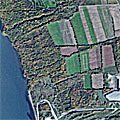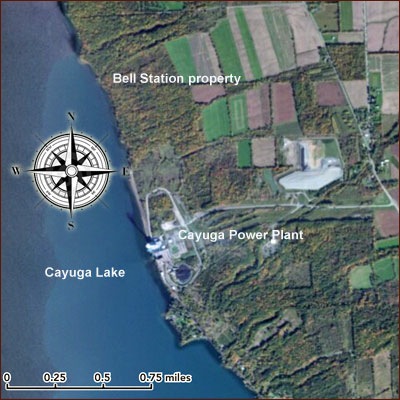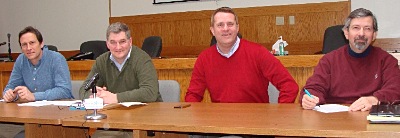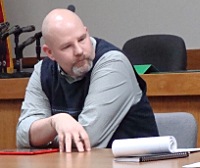- By Dan Veaner
- News
 Print
Print  Department of Environmental Conservation (DEC) Regional Director Kenneth Lynch was in Lansing Last Friday to talk to residents about the prospects for a state forest or Wildlife Management Area (WMA) on nearly 500 acres of NYSEG-owned property in northwest Lansing. More than 50 residents filled the Lansing Town Hall to ask questions and express their opinions on the project. With the passage of a Town Board resolution in support of the project, Lynch says the DEC has what it needs from the Town to try to purchase the property.
Department of Environmental Conservation (DEC) Regional Director Kenneth Lynch was in Lansing Last Friday to talk to residents about the prospects for a state forest or Wildlife Management Area (WMA) on nearly 500 acres of NYSEG-owned property in northwest Lansing. More than 50 residents filled the Lansing Town Hall to ask questions and express their opinions on the project. With the passage of a Town Board resolution in support of the project, Lynch says the DEC has what it needs from the Town to try to purchase the property."Despite the somewhat long history of interest in this property, we are still very early in the process," said Lynch. "There is pretty good interest in our department for moving this one forward."

The Bell Station property owned by NYSEG is the single largest piece of private undeveloped property on any finger lake. It's approximately 490 acres that include 3,400 feet of shoreline on Cayuga Lake. Approximately half is wooded, and half leased farmland going up to Ridge Road.
Lynch says that the project is anything but certain. He says it is supported by the State and the Department of Environmental Conservation (DEC) in particular. Finger Lakes Land Trust Executive Director Andy Zepp says the DEC has a history of managing a cooperative hunting program on the property that NYSEG used to permit. But Lynch said even in the best case scenario a successful outcome is four or five years away.
 Left to right: Finger Lakes Land Trust Executive Director Andy Zepp, DEC Regional Director Kenneth Lynch, Tompkins County Legislator Mike Sigler, Lansing Councilman Ed LaVigne. Sigler invited Lynch to update residents on the prospect of a state forest or Wildlife Management Area on about 500 acres of lakefront property in northwestern Lansing.
Left to right: Finger Lakes Land Trust Executive Director Andy Zepp, DEC Regional Director Kenneth Lynch, Tompkins County Legislator Mike Sigler, Lansing Councilman Ed LaVigne. Sigler invited Lynch to update residents on the prospect of a state forest or Wildlife Management Area on about 500 acres of lakefront property in northwestern Lansing.The short version is this: first the State decides whether or it it is interested in creating a forest or WMA. It only pursues the project if it has support from the Local municipality, and if it can find the money to purchase the land. Once that has happened a Unit Management Plan (UMP) is developed in concert with local citizens to determine what uses will be allowed on the property. Finally the property is developed according to that plan (trails, facilities, etc.) and opened to the public.
The first two steps are complete. Although the State Parks Department is not interested in managing the property, the DEC has a strong interest in doing so. And the Town Board passed a resolution in support of the project last November.
When the Town passed that resolution it included the caveat that tax revenue be preserved. When Lynch came to Lansing a year ago he explained that if the site is designated as a state forest the State automatically pays property taxes to local taxing authorities. The Town, Schools, Fire District and library would retain tax revenue. The County would not .
 Tompkins County Director of Assessment Jay FranklinTompkins County Director of Assessment Jay Franklin noted that State officials determine the taxable value based on a state-wide average of state forest lands. He said Lansing would probably lose as much $1.5 million of property value because land here is valued higher than other locations around New York. Last Year Lynch said that might be negotiable if the State legislature would agree to legislate a higher value in this case.
Tompkins County Director of Assessment Jay FranklinTompkins County Director of Assessment Jay Franklin noted that State officials determine the taxable value based on a state-wide average of state forest lands. He said Lansing would probably lose as much $1.5 million of property value because land here is valued higher than other locations around New York. Last Year Lynch said that might be negotiable if the State legislature would agree to legislate a higher value in this case.Current tax revenue from the property is about $57,000. Of that $39,00 goes to the school district, $13,000 to the County, and the rest is about evenly split between the Town and Fire District. Franklin said that amounts to about $27 per thousand dollars worth of property value.
The State automatically pays taxes on state forest land. A state forest must have a minimum of 500 acres, and by current estimates the property falls short by approximately ten acres. If the land is designated as a Wildlife Management Area the State does not typically pay property taxes. Lynch said that it may be possible to purchase enough contiguous acreage to bring it up to state forest level. Resolving the tax issues will likely prolong the process.
"It will be some time, especially with the tax issues," Lynch said. "If we needed legislation we probably would not do that in this legislative session. This is very ballpark: I think the quickest we could purchase the property would be within a year, but we have seen these last four or five years."
Lynch explained that the uses of the property wouldn't be much different from the public's standpoint if it is designated as a forest or a WMA.
"If we buy it as a state forest property we manage it for reforestation," Lynch explained. "If we buy it as a Wildlife Management Area we manage it primarily for wildlife management. In both cases we would develop a Unit management Plan, which is an open process with the public to hear from you what you would like to see as far as recreational use and use of the property. In both cases general uses would be allowed: hunting, fishing, hiking, bird watching, trapping... typical recreational uses we see on state land."
Lynch said that while swimming is typically not allowed, boating uses, horse trails, snowmobile and bicycle trails and camping would be considered in the process of developing the management plan. He said that the farm land that is currently leased by a local farmer could remain as farmland.
The property was originally intended to be the location for the Bell Station nuclear plant, which was to be constructed in the 1970s. In 1969 the $320 million plant was approved by the Tompkins County Board of Supervisors approved the plant. A 2,436,000kw reator was planned to produce a net 838,000kw of power. But the plant was never built.
Zepp says that Iberdrola, the Spanish company that owns NYSEG, has indicated it is not in a position to donate the land, but would like to sell it for conservation. The Land Trust is acting as an intermediary to help facilitate the purchase by the State. Zepp says that if Iberdrola is anxious to sell quickly the Land Trust could purchase it until the State can come up with the money.
All of this assumes that Iberdrola is still interested in selling the land to the State and that they can agree on a price. One resident asked what supporters can do to help push the project forward. She asked whether private money could be donated to facilitate the process. Lynch said that he doesn't think so, but other forms of citizen participation are key to the project.
"At this point you've done plenty," Lynch said. "It's on the open space plan. We know of your interest. You certainly have our interest. Stay tuned. If we have news to bring, we'll let you know. Certainly if we were fortunate enough to move to acquisition we would want you all to participate in the unit management planning process."
v10i4



